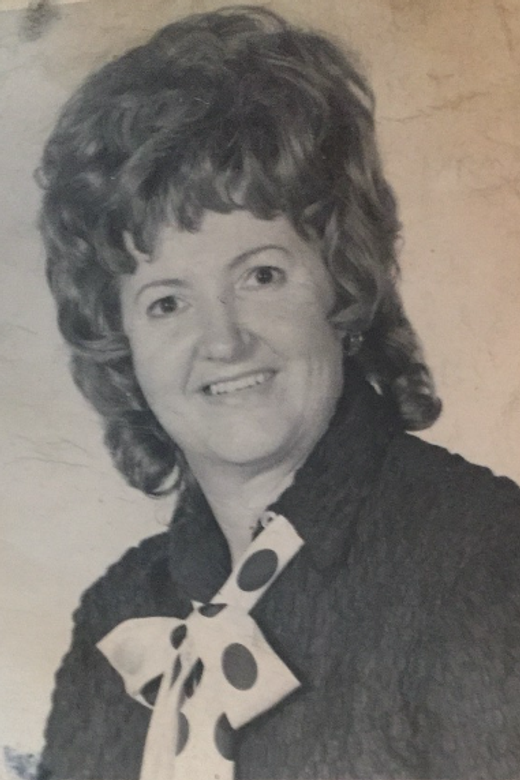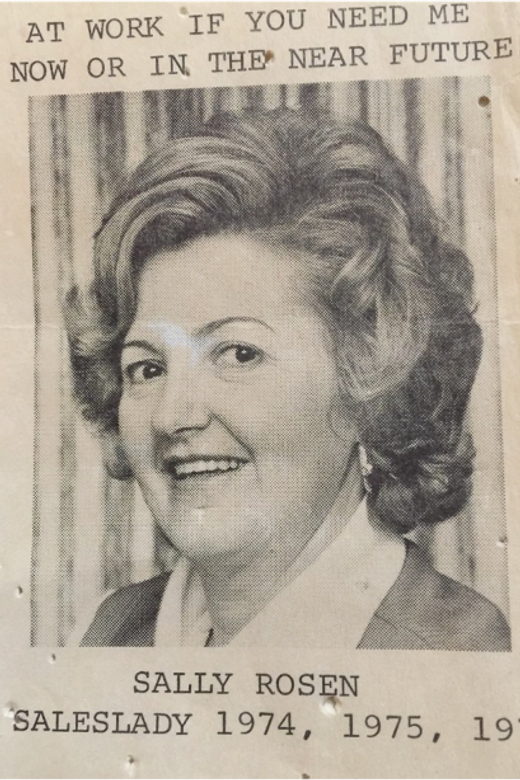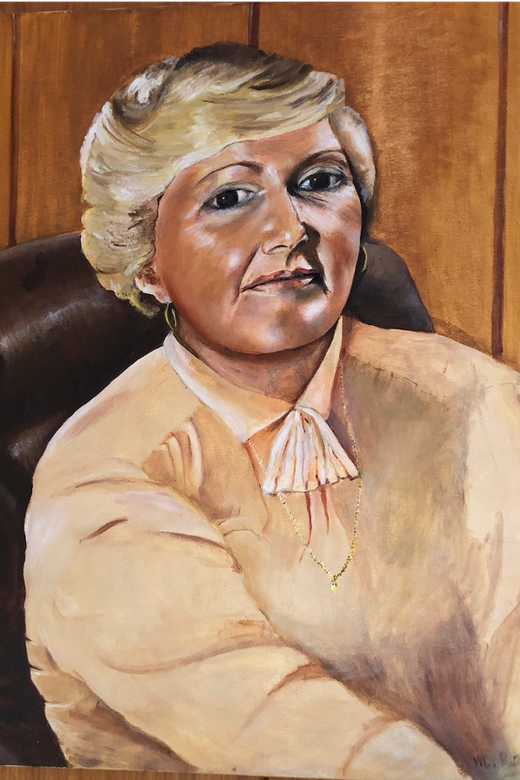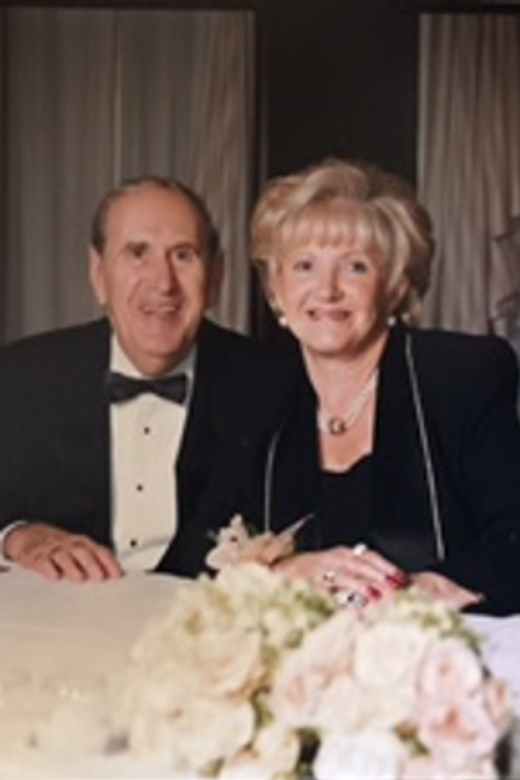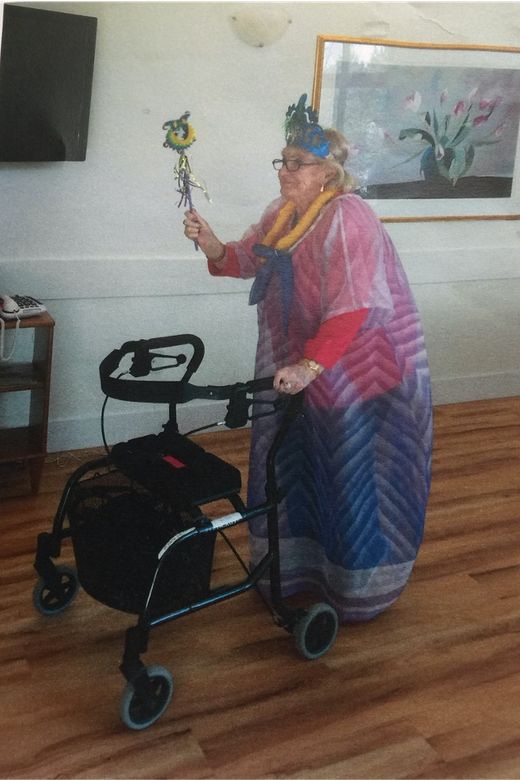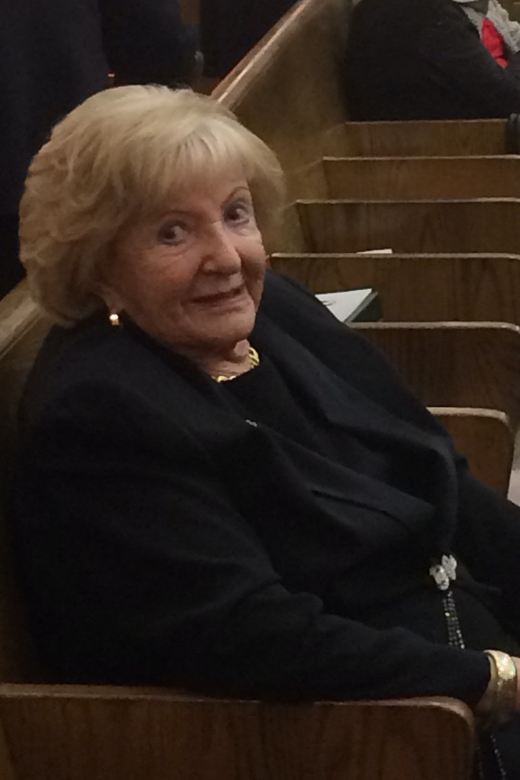Sally Rosen
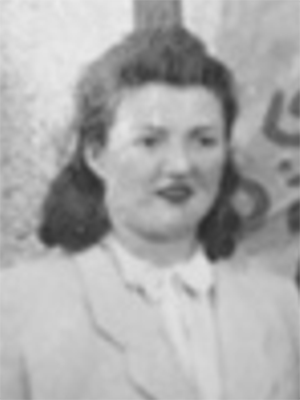
Born: Lodz, Poland, 1925
Wartime experience: Ghetto and camps
Writing Partner: Marilyn Miller
Sally Rosen was born in Lodz, Poland, in 1925. After the German occupation of Poland, she and her family were forced into the Lodz ghetto, where they had to work.
They lived there until the ghetto was liquidated in August 1944. Sally and her mother were deported to Auschwitz-Birkenau and then taken to a labour camp in Bremen, Germany, where they worked until early April 1945. When the camp was evacuated, they were sent on a march and then a transport to the Bergen-Belsen concentration camp, where they were soon liberated. After the war, they continued to live in the Bergen-Belsen displaced persons camp, where Sally met her future husband, Michael Rosenzweig (Rosen). They married there in February 1947 and immigrated to Canada in January 1948. Sally and Mike settled in Toronto, where they worked a variety of jobs and raised their family, eventually opening their own corner store. In 1974, Sally earned her real estate licence and worked in the field for more than forty years. Sally was dedicated to Holocaust education and frequently spoke to students about her experiences. Sally Rosen passed away in 2020.
In the Lodz Ghetto
I was born in 1925 in the city of Lodz, Poland, with the name Sala Thugut. Lodz was a beautiful city, but the Jews were very poor where I lived with my mother, Helen (Chana Brucha), and my father, Meyer. My father was an atheist but felt that the Yiddish language was very important and so that’s what we spoke at home. He was a house painter, and we lived what I felt was a comfortable life. We were not rich, but we lived within our means in a two-bedroom apartment. Our neighbourhood was ethnically mixed but primarily Jewish.
My father passed away in 1930. Afterward, my mother and I resided in a very small room, and she had an extremely hard time making ends meet. I didn’t have any dolls or toys to play with. We were forced to move out of this apartment because my mother could not pay the rent. The woman across the street took us in, which my father had arranged before his death.
I went to a private Jewish school for both boys and girls, where I spoke Yiddish. My father had paid the fees for this school before his death. I enjoyed learning, and the teachers were very dedicated; it was a good school for cultural activities. I went to this school until Grade 7, at which time I had to stop. I also went to a summer camp near Warsaw, but I don’t recall the name, and I belonged to a Jewish organization called the Bund, which had a program for young children like me.
My school was closed in 1939, and the operators said they would open it again the following year. After the war broke out, this became an unlikely possibility. I remember that Friday night, September 1, 1939, when Germany invaded Poland, like it was yesterday. The war had started.
In early February 1940, the Germans established a ghetto in Lodz. The Nazis forced about 160,000 Jews, more than a third of the city’s population, to live in this small area and surrounded it with barbed wire to further separate the Jews from the rest of the city. We were forced to move into the ghetto and live in a room underneath a set of stairs that barely had any light, heat or hydro. I could not see people from any windows but instead saw feet move across the crack at the bottom of our door. It was a horrible existence. It was a terrible place, with people dying in the street. If you were sick, you got better on your own because anyone who went to the hospital would likely not come out alive. People were dying by the thousands and were shot on the street for no reason — I was very scared. Life seemed to go on as best as it could, but the horrific situation just got worse each day.
The ghetto worked like a small city with a police force, cleaning crew and grave diggers. My mother was thirty-eight and had a job in a clothing factory, sewing clothes and fixing garments. I had to work as well. My job was in a straw factory making straw foundations for boots for the German soldiers, for when they went to the front. It was a dreadful task. For my job, I would have to be up at 6:00 a.m. and at work shortly after that, only returning home for dinner and to go to bed. There was not much time for anything else. Sometimes when I walked home, I would see people on the street asking for help. Many people committed suicide in the ghetto. Life for us was unimaginable.
One day, the manager came to me and said, “Sally, would you like to leave the ghetto?” What a question that was! Of course, I would have liked to, but I felt that I couldn’t go anywhere. In some ways, the ghetto made me feel safe because it was familiar — the language, the people — and I was afraid to go anywhere else. I was only fifteen years old at the time and I had heard rumours about terrible camps Jews were being sent to. The manager said he would send me somewhere, but he didn’t tell me where.
We got very little to eat in the ghetto. We had to get a food card and you had to work in order to get these cards. Once a day I went to a store and received soup, water and a piece of bread. Sometimes we were able to take scones from the factory. We had to wear a Star of David on the outside of our clothes, and we weren’t allowed to go anywhere. In other words, I went to work and that was about it. We were scared to go to certain places and felt that we needed to stay invisible. The ghetto seemed far away from our old street, but I was a young girl with no choice about where I was to live or what the place looked like. I had to act much older than my years.
Every few months in the ghetto there was a selection of people to be shipped out. In 1942, I remember that we were rounded up to be examined in the selection, and my mother was very pale. To try to look healthier, she took some red colouring and put it on her cheeks. We passed that selection. There was a committee that would put together the names of the people to go on the selection list. Again, we were put on the list in 1943. We didn’t know where everyone was being taken, but we had heard rumours about Auschwitz. My mother begged one of the supervisors on the committee to take us off the list and he did. Each selection had about ten thousand names.
We were in the Lodz ghetto for four and a half years.
By this time in the war, I had pretty much given up. But then my mother told me that if I sat on the ground I would feel the tanks rolling in from the British army. She was right! I was liberated.
Awful, Horrid Place
The time came for the selection that would take us out of the ghetto. In August 1944, I was taken by cattle car to Auschwitz-Birkenau, along with my mother. We were given a round loaf of bread and a little jar of jam. The journey on this train was three days long, and there were about eighty to ninety people on the cattle car with us. A pail was put in the corner for us to relieve ourselves. By the time we got to our destination, approximately fifty-nine people had died. There were people waiting at Auschwitz-Birkenau who were assigned to take away the dead bodies from the cattle cars. These people would take hooks and attach them to the bodies to pull them out of the train. What struck me the most when I got off the train was the strong smell. I asked one of the people who was there already what that smell was, and he pointed to something that looked like a smokestack and then I knew.
We were taken and put into a line that consisted of four girls who had come with me and my mother. The four girls were with their mothers as well. It was well known that everyone under the age of fifteen was destined for the gas chambers. I recall that the infamous Josef Mengele was there on my arrival, and I was lucky that he looked away at that moment — I was able to join the “saved” line. I shoved my mother into this line, too, but unfortunately the other mothers who came with the four girls were not saved. They went to the gas chamber and were killed.
I knew about the two lines for the selections because the Nazis posted prisoners, known as kapos, at the arrivals area. The kapos informed the incoming prisoners on methods of survival. One line was for men and another for women and children. We were broken into four lines and inspected by SS officers. These lines were then divided into two groups: one lived and one died. It was as simple as that and as horrible as that. Mengele, or another SS doctor, had looked at me and I looked down. You couldn’t look them in the eyes. At that moment, I felt that God said, “I shall make a miracle,” and the selection officer turned away, so that was when I changed lines.
I think that ten to twenty trains came that day, with all kinds of people from different countries, different cities. There were pregnant women and people with babies. They shaved my hair, and I was assigned to a barracks. I remember there were big mountains of clothes that we now know were taken from people when they arrived there. For the following days and nights we just waited with absolutely nothing to do.
I remember the terrible stench of death. It is a smell that has followed me through the years since, a sensory memory that is difficult to shake. The living conditions in Auschwitz were horrible. They took us out every day to walk, and the Nazis killed anyone on the spot who didn’t look well or else sent them to the gas chambers.
The second time I was at a selection, I was at my breaking point. The girls who were in my barracks told me they needed a way out. We had been there for ten days. The girls looked to me as a leader and expected me to come up with an idea.
A transport was going to Bremen, so I decided that we would run away to Bremen with this transport. My mother was with us, and on our way out, through an open gate, another miracle happened. We were stopped and asked where we were going. I told the officer we were going to work, at which point he could have had all of us shot dead. Somehow this did not happen, and he let us go.
A truck picked us up to take us to a work camp at Bremen, Germany. At that time, there were nine working camps near the city. I worked there for almost a year. I cleaned basements, toilets and fridges inside the houses occupied by the Germans. I cleaned the roads as well. I did whatever they asked me to do. Our food was watery soup and some bread. Sometimes the German people left food out for us on their balconies as a reward for the work. I lived there until early April 1945 in a regular barracks with more than one hundred other women. This was strictly a women’s camp. We had no contact with the German SS officers during this time. We were supposed to keep our heads down because we were afraid of catching their eyes. We did sneak looks every now and then, but we did this at the risk of being hit with a rifle or shot.
When the camp where I was working was closed, they transported us to Bergen-Belsen concentration camp, and my weight went down to about seventy-five pounds. My mother tried to keep me alive by getting me potatoes. One day, she was getting me these potatoes, and a German soldier saw her and hit her with a rifle. She returned to me bleeding profusely. All I could think of doing to tend the wound was to get a rag and soak it in urine. A Polish doctor later told me that this method ended up saving my mother’s life.
By this time in the war, I had pretty much given up. But then my mother told me that if I sat on the ground I would feel the tanks rolling in from the British army. She was right! I was liberated in Bergen-Belsen on April 15, 1945, by the British Army. This awful, horrid place had then become a displaced persons (DP) camp, and we were to begin our new lives here. However, it was very hard to assume a normal life.
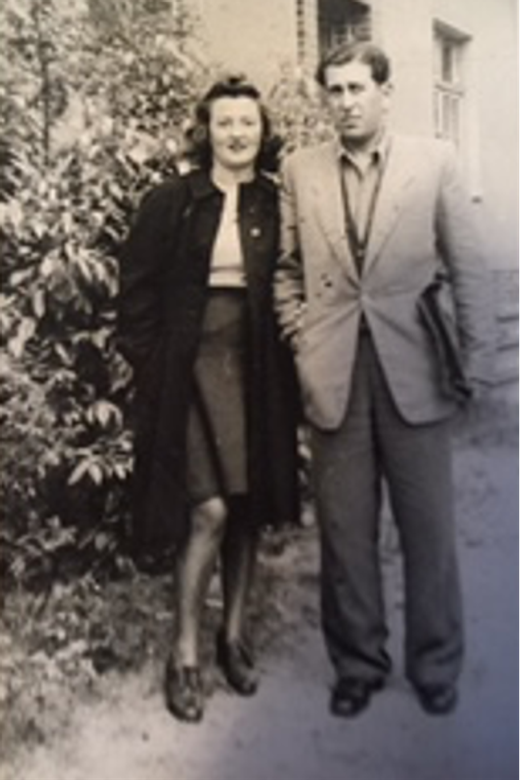
Sally and her fiancé, Michael Rosenzweig (Mike Rosen). Bergen-Belsen displaced persons camp, Germany, 1946.
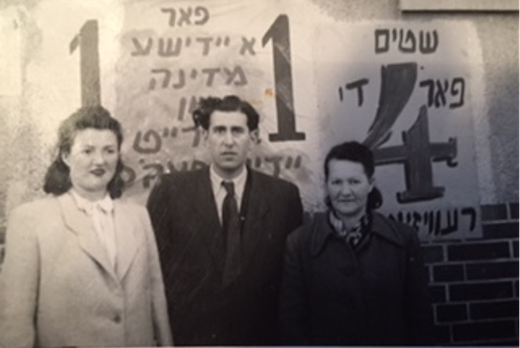
Sally (left) with her husband, Mike, and her mother, Helen Thugut. Bergen-Belsen, circa 1947.
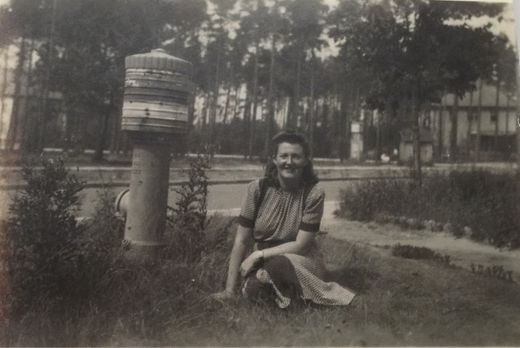
Sally in a downtown park. Toronto, 1948.
Our New Life
At the displaced persons (DP) camp, a woman told me she knew a man who she thought would be nice for me to meet. His name was Michael Rosenzweig, and he had been in Dachau concentration camp during the war and was now living in Munich, Germany. He had no family, as his brother had died from typhus and his sister and her family, including a four-year-old child, had been taken to another concentration camp. This woman sent for him to come to the Bergen-Belsen DP camp, and we met. Mike and I were married in Bergen-Belsen on February 2, 1947, and my mother was able to see this union take place. I wore a dress with a short veil. There were about twenty people in attendance at our outdoor wedding, and it was very simple. Against all odds, we survived to tell our story to the world and were able to be joined together in marriage. Who would have thought?
I became pregnant in 1947, and at that time we were able to immigrate to Canada. We travelled by a military transport ship, the General S.D. Sturgis, and arrived in Halifax in January 1948.
After arriving in Halifax at Pier 21, we chose Toronto to be our home. Mike had two cousins who lived in Toronto, so that is where we decided to go. I was still very young but determined to make a new life for my husband, myself and my new baby daughter, Laura, whom I gave birth to in 1948, the same year we came to Canada. Being a Capricorn, I feel, helped me jump over those mountains and survive.
We came to Toronto with very little. We lived on Huron Street in a big house with twelve other families. We obtained this housing through the Jewish Congress, but it was difficult and the accommodations were quite awful. We barely had a penny to our name. Mike worked as a presser, and a tailor’s union found the job for him. I took a hairdresser course at Marvel Beauty School and was a hairdresser for a while. I also went to night school to learn English. One day, Mike went home on the bus and had our important documents with him, along with his first paycheque of sixty dollars. Somehow he lost the documents and his paycheque; they were either stolen or he by dropped them somewhere. He could not get those papers back. We even put an ad in a newspaper in hopes of retrieving those documents, but they were never found.
I worked two jobs to help make ends meet. I was a cashier in a grocery store and in a bakery called Health Bread. I put Laura in a nursery where she was looked after while I was at work. Eventually, we bought a home on Shaw Street and kept two rooms for ourselves and rented out the rest of the house. We took a variety of jobs over the next few years, learned English and settled into our new lives. On weekends, we would get together with other survivors and their families. Later, we bought a small business and lived in the apartment above the store.
My mother had not come with us to Canada because she had been seriously ill with typhus in the DP camp and had been sent to a hospital in Germany to recover; she was there for almost a year. She had then decided to go to Israel because it was easier than immigrating to Canada at the time. She got married there but eventually divorced. In 1954, she too came to live in Toronto.
In 1960, we moved farther north in Toronto, where other Jews were moving. Eventually, we were able to buy a variety store at Yonge and Finch. I borrowed one thousand dollars to open this business. We worked in the variety store for ten years. It was seven days a week, twenty-four hours a day. It was hard work, but we made a living. Across the road from the variety store, there was a Century 21 real estate office, and the agents would frequently visit our store, so we got to know them. They would say to me, “Sally, what is a girl like you doing working in a place like this? Come with us and we’ll teach you all about the real estate business.” By then, my children — Laura, Howard and my youngest, Rhonda — were a little older and they were looked after by my mom. So I went to school to learn about the real estate business. Real estate became the career I was destined for; I started working for that Century 21 office across the road on May 16, 1974, and stayed there for forty-three years. It was the happiest period of my life.
***
I don’t think my experience in the Holocaust affected my children too much. I talked about my experience when my children asked me to share the story with them. A few of my grandchildren have participated in the March of the Living, where they went to Poland to see the camps and get a greater understanding of my story. My husband and I have attended many Holocaust survivor gatherings together, and sometimes with Laura and Howard.
In 1995, Mike, Laura and I returned to Poland and visited Auschwitz and Majdanek (where I never was). At Majdanek, which is now a museum, I saw heaps of ashes from the Jews who were burned. We also found my father’s gravestone in the Lodz cemetery. Afterward, we went to Israel in time for Yom Ha’atzmaut, Israel’s Independence Day — it was from ashes to joy.
My friends in Toronto are mostly survivors, but I also met many people from Lodz and from Canada after the war. I joined a Hadassah group and went there until it closed. When we congregated as a group, it was often the case that survivors would tell their stories, which I found difficult to listen to.
My experience during the war has never left me, but I do not have nightmares about what happened. I always tried to keep a positive outlook when I began my new life in Toronto, always hoping for a good life for my children. We were now at peace. I will always live with what I went through and think about it all the time. I went through such hell! Not everyone can talk about it but I find it necessary to educate the next generation so it’s never forgotten. I do my part by speaking to school-age children about the Holocaust at the Lipa Green Centre (the Sarah and Chaim Neuberger Holocaust Education Centre). When I speak to Christian children, I tell them it is very important to be tolerant of other people. If you can’t be tolerant, then walk away!
I lost forty members of my family during the Holocaust. I feel it is my duty to share these experiences and talk about the importance of tolerance so that tragedies like this will never happen again and to combat those Holocaust deniers who say that the Holocaust never happened. The Holocaust deniers say that the Jews made up the story and that Auschwitz was a beautiful place. I can tell you I was there and there was no beauty. It was a horrible, horrible place, beyond anyone’s imagination. In ten to fifteen years, when survivors like me are no longer alive to tell our stories, it is going to be up to today’s children to keep telling them for us.
